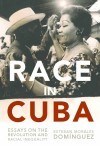
NEW! Race in Cuba: Essays on the Revolution and Racial Inequality by Esteban Morales Domínguez
Esteban Morales Domínguez is one of Cuba’s most prominent Afro-Cuban intellectuals and its leading authority on the race question. Available for the first time in English, the essays collected here describe the problem of racial inequality in Cuba, provide evidence of its existence, constructively criticize efforts by the Cuban political leadership to end discrimination, and point to a possible way forward. | more…








